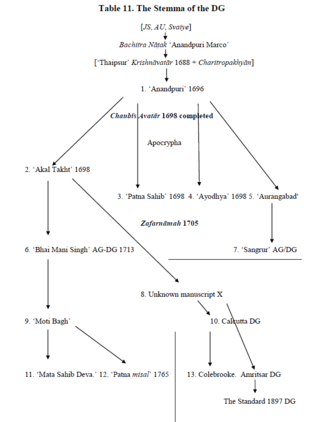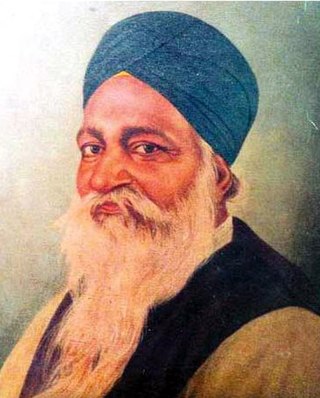
Jarnail Singh Bhindranwale was a militant. After Operation Bluestar, he posthumously became the leading figure for the Khalistan movement.although he did not personally advocate for a separate Sikh nation.

Panth Rattan Shiri Gurcharan Singh Tohra was a president of Shiromani Gurdwara Parbandhak Committee (SGPC), a Sikh body in charge of controlling Gurdwara. He died of a heart attack in New Delhi on 1 April 2004 at the age of 79. He remained the head of the SGPC for a record 27 years, and was one of the most influential and controversial Sikh leaders of the 20th century.

The Shiromani Gurdwara Parbandhak Committee is an organization in India responsible for the management of gurdwaras, Sikh places of worship, in the states of Punjab and Himachal Pradesh and the union territory of Chandigarh. SGPC also administers Darbar Sahib in Amritsar.

The Damdamī Ṭaksāl, Jatha Bhindra(n), or Sampardai Bhindra(n) is an orthodox Khalsa Sikh cultural and educational organization, based in India. They are known for their teachings of vidya as well as gurbanisanthiya. Its headquarters are located in the town of Mehta Chowk, approximately 40 km north of the city of Amritsar. It has been described as a seminary or “moving university” of the Sikh countryside.

The Akal Takht is one of five takhts of the Sikhs. It is located in the Darbar Sahib complex in Amritsar, Punjab, India. The Akal Takht was built by Guru Hargobind as a place of justice and consideration of temporal issues; the highest seat of earthly authority of the Khalsa and the place of the Jathedar, the highest spokesman of the Sikhs.

A gyani or giani is an honorific Sikh title used by someone learned in Sikhism and who often leads the congregation in prayers, such as Ardas, or in singing (kirtan). The word gyan means "knowledge" in Punjabi, being a derivative of the Sanskrit word jnana. So a "gyani" is one who has spiritual and religious knowledge and can help the congregation, the Sadh Sangat, in understanding the Sacred Texts and the history of the religion.

Teja Singh Akarpuri was an Indian and Sikh politician who served as the 11th Jathedar of Akal Takht from 1921 to 1923 and 1926 to 1930. He was the First MP from Gurdaspur constituency In Lok Sabha from 1952 to 1957 and was succeeded by Diwan Chand Sharma.
A jathedar is a leader of high regard chosen to head and ensure discipline within a jatha, a troop of Sikhs.
Sadhu Singh Bhaura was a Sikh missionary who served as the 21st Jathedar of the Akal Takht from 1964 to 1980.
A takht, or taḵẖat, literally means a throne or seat of authority and is a spiritual and temporal centre of Sikhism. There are five takhts, which are five gurudwaras that have a very special significance for the Sikh community. Three are located in Punjab whilst the remaining two are located outside of it.

The history of the Dasam Granth is related to the time of creation and compilation of various writings by Guru Gobind Singh in form of small booklets, some of which are Sikh prayers. The first combined-codex manuscripts of the Dasam Granth were created during the Guru period. It is also said that after 1708, the Dasam Granth was allegedly compiled by Mani Singh Khalsa, contributed by other Khalsa armymen under direct instructions of Mata Sundari and this volume is recognized as Sri Dasam Granth Sahib. The present day Dasam Granth includes Jaap Sahib, Akal Ustat, Bachitar Natak, Chandi Charitar Ukati Bilas, Chandi Charitar II, Chandi di Var, Gyan Prabodh, Chaubis Avtar, Rudra Avtar, 33 Sawaiye, Khalsa Mahima, Shashtar Nam Mala Purana, Ath Pakh-yaan Charitar Likh-yatay and Zafarnamah.
This is a list of works by Indian Punjabi-language writer Bhai Vir Singh (1872–1957). This list includes his poetry, novels, translations, plays, and non-fiction.

Ramkali Sadh is a composition present in Guru Granth Sahib on ang 923/924, composed by Baba Sundar, in Ramkali Raga. The composition has 6 stanzas. Sadh literally means Call (ਸੱਦਾ). This narration tells Sikh attitude towards physical death of a Gurmukh. It also narrates events of succession of Gur Ram Das over Gur Amar Das.
Giani Gurbachan Singh is a Sikh preacher who served as the jathedar of the Akal Takht from 2008 to 2018.

The 1978 Sikh–Nirankari clash occurred between the Sant Nirankari Mission and Sikhs of Damdami Taksal and Akhand Kirtani Jatha on 13 April 1978 at Amritsar, Punjab, India. Sixteen people—thirteen traditional Sikhs and three Nirankari followers—were killed in the ensuing violence, occurring when some Akhand Kirtani Jatha and Damdami Taksal members led by Fauja Singh protested against and tried to stop a convention of Sant Nirankari Mission followers. This incident is considered to be a starting point in the events leading to Operation Blue Star and the 1980s Insurgency in Punjab.

Pashaura Singh (1928–2008) also known as Santa Singh or to Nihang Sikhs as Jathedar Akali Baba Santa Singh Ji Nihang 96 Crori was the 13th Jathedar of Budha Dal, succeeding Akali Chet Singh.

The Jathedar of the Akal Takht is the head of the Akal Takht and head of the Sikhs worldwide. The jathedar has the de facto power as the supreme spokesperson of the Khalsa to summon, trial and sentence any person who identifies as a Sikh from the Akal Takht.

Udham Singh Nagoke was a freedom fighter, Jathedar of Akal Takht and member of Rajya Sabha.

Mohan Singh Nagoke was a politician from Punjab, freedom fighter and former Jathedar of Akal Takhat Sahib.

Surinder Singh Sodhi was a Sikh militant known for being the chief bodyguard, chief hitman, transport minister, and right-hand man of Jarnail Singh Bhindranwale.
















